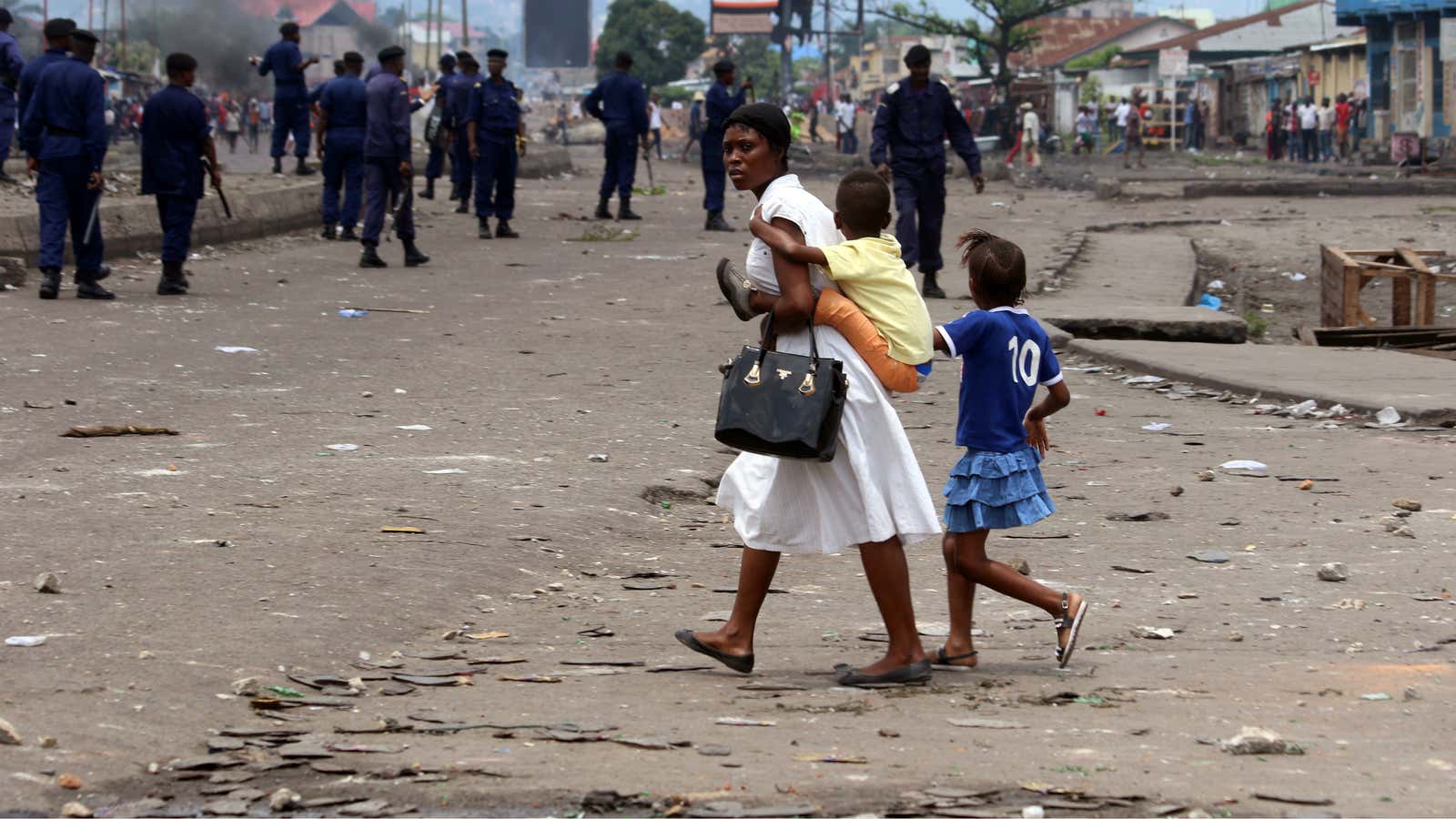The Democratic Republic of Congo (DR Congo) ranked 176 out of 187 on the latest United Nations Human Development Index and two new investigations have shed more light on why that’s the case.
Despite being Africa’s biggest copper producer and the world’s leading source of cobalt with “up to $10 billion” worth of those minerals mined and sold abroad, an investigation by Global Witness, the anti-corruption charity, shows that “as little as 6%” of DR Congo’s annual mining exports reach the national budget.
As a result, despite the country’s vast mineral wealth, an average Congolese national is “among the poorest on the planet,” Global Witness says.
This reality, described as a “paradox of poverty”, is the consequence of large scale corruption which ensures very little of the country’s mineral wealth find its way back to the people. Between 2013 and 2015, mining revenue of up to $1.3 billion—twice the amount the country spends annually on health and education—failed to reach the treasury, according to Global Witness. The shortfall is blamed on a “dysfunctional state-owned mining company and opaque national tax agencies” as well as “corrupt networks linked to President Joseph Kabila’s regime.”
Systemic corruption
Gécamines, the state-owned mining company described as a “closed book in terms of revenue management,” owns shares in over 20 mining projects in DR Congo yet it does not make significant payments to the national treasury and has been known to owe its workers for months. Once a major player in mining, Gécamines currently carries out no mining of its own.
The rot in Gécamines is traced back to the 1980s. Fully operational at the time, the company contributed 43% of DR Congo’s budget revenues and also produced half a million tonnes of copper annually. However, Gécamine’s collapse in the 1990s has been attributed to “decades of looting” by Mobutu Sese Seko, former president of Zaire, as DRC was known before he was disposed. The company’s vast earnings are believed to have been used to fund the late dictator’s grip on power.
In 2010, the government changed Gécamines into a commercial entity and it now functions as a “caretaker” of DR Congo’s immense copper and cobalt wealth. Providing 60% of the world’s cobalt, Gécamines has overseen a price boom with the mineral in high demand for lithium-ion batteries currently used to power some of the world’s most renowned electric cars and smartphones. The price of cobalt is up by around 80% so far this year.
But Global Witness says Gécamines’ commercial status is “in name only.” Its shares are wholly owned by the government so it remains “under the control of those in power.” A popular racket which was uncovered by the report involves “farming out” of mining licenses at knockdown prices. In one instance, offshore companies paid $275 million to gain control of the mining assets which were worth at least $1.6 billion.
Just as crucial to Congo’s disappearing wealth is the existing culture of “predatory” tax agencies. Under DR Congo’s laws, tax agencies can levy companies, including miners, sometimes to the tune of millions of dollars, and keep some of the fines recovered to fund their operations. “The opacity around the withheld funds,” Global Witness says, results in the system being “highly susceptible to corruption.”
Elite corruption
In a separate report, Congo Research Group (CRG) found that president Joseph Kabila’s family, including some of his siblings, “either partially or wholly owns” more than 80 businesses operational inside and outside DR Congo.
In addition to over 100 mining permits for diamond and gold, president Kabila and his wife own 70,000 hectares farmland—around 10 times the size of Manhattan. Jaynet Kabila, the president’s twin sister, owns a stake in Vodacom Congo, DR Congo’s largest mobile network and also holds more than 100 mining permits while Zoé Kabila, the president’s brother, has a string of business interests in several companies involved in DR Congo’s lucrative mining sector. Cosha Investments, one of Zoé’s companies, is also involved in the printing of DR Congo’s driving licenses. Both Zoé and Jaynet Kabila are members of parliament.
In general, the family’s business operate across multiple sectors spanning aviation, banking, telecoms and real estate. But while the value of its assets are “difficult to determine,” the report says assets owned by the family “are easily worth many tens of millions of dollars.”
CRG says while the Kabila family’s business holdings are not “necessarily illegal or corrupt,” some may violate DR Congo’s law or codes and “raise serious questions of conflicts of interest.” For example, the report says the president’s sister has been granted more mining permits than allowed under the national mining code. CRG also posits that “it is clear” that DR Congo’s elite have “abused their office for personal enrichment.”
The revelations come at a particularly difficult time for DR Congo. Violent protests have broken out across the country with tensions high after president Kabila failed to step down at the end of his second term which ended in December last year. Intermittent conflict in 2016 resulted in nearly a million people—the most anywhere in the world—fleeing their homes. The situation is unlikely to ease soon as DR Congo’s budget minister said in Febraury the country may be unable to afford to hold a presidential election expected to cost $1.8 billion.
